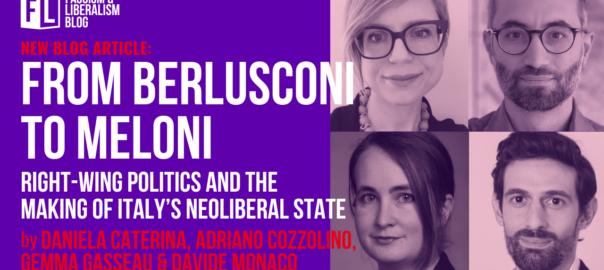Profiting from Neoliberalism: How the Radical Right Gains From Crumbling Public Services
by Simone Cremaschi
23.10.2025
The rise of the far right is often linked to economic decline and depopulation of “left behind regions”. But could public service cuts, as part of broader neoliberal austerity policies, play an independent role? In this blog, Simone Cremaschi cites research he and his colleagues have conducted into otherwise similar municipalities in Italy, which, for varying reasons, underwent significantly different levels of public service cuts. They found evidence that regions with steeper retrenchments recorded higher shifts in support for the far-right. Using zero-sum logic, far-right parties have been able to frame shrinking services as a problem of demand, not supply. This suggests that restoring and rebuilding public services could halt the rise of the far-right. The question now is whether mainstream parties will re-build the credibility and support to do so.
Public services across Western Europe are under strain. Years of economic stagnation, financial crises, a pandemic, and rising energy prices have left governments with record debt and soaring interest payments. As a growing share of tax revenue is swallowed by debt service, less remains for hospitals, schools, and local infrastructure. These constraints leave little room to reverse a decade of neoliberal-imposed austerity, which closed or hollowed out key public services – from rural post offices and public transport links to police stations and GP practices in major cities.
One might expect these conditions to benefit parties on the left, traditionally associated with calls for higher public spending and stronger social support. Yet a series of empirical studies I have conducted with co-authors shows that reduced access to public services – what we call public service deprivation– often fuels support for radical-right parties instead.[i] This political backlash to service cuts helps explain why these parties have made such significant inroads into mainstream politics in the past years.
We began our research in Italy, where policy debates in recent years have devoted considerable attention to so-called “inner areas” – areas marked by economic stagnation, depopulation, and isolation from essential services such as schools, hospitals, and train stations. These territories struck us as the concrete embodiment of the “left-behind places” often invoked by journalists to explain the geographic concentration of support for radical-right leaders like Donald Trump, or the Brexit referendum. This led us to ask whether the availability – or withdrawal – of public services could be driving this geography of discontent.
How Public Service Deprivation Fuels Exclusionary Politics
We began answering this question by studying a 2010 reform that required Italian municipalities below a fixed population threshold to deliver key public services – such as policing and waste collection – jointly with neighboring municipalities. Because of an arbitrary cut-off, it created a natural experiment: some municipalities were forced to amalgamate services while others of a similar size were not. This allowed us to compare municipalities in these two groups across time and isolate the effect of reducing public services on electoral outcomes. Our results, published in the American Journal of Political Science [ii], show that this reform ultimately reduced access to essential services and, in turn, boosted support for radical-right parties such as Salvini’s League among affected voters in the years that followed.
Our analysis suggests that public service deprivation fuels radical-right support by generating grievances that resonate with political rhetoric linking declining services to immigration. When communities accustomed to reliable public provision – as is common in Italy and Western Europe – experience sudden deterioration, they develop a sense of unfairness and neglect: a perception that “their” community is no longer receiving its fair share of resources and that political elites do not care. Because public services are the primary channel through which citizens interact with the state and observe how their taxes are spent, their decline strikes at the heart of the social contract. These grievances translate into a demand for solutions at the ballot box, creating fertile ground for parties that promise to restore services by reallocating them toward “deserving” locals.
Radical-right parties have proven particularly adept at meeting this demand. In our data, we show that they increasingly mobilized the issue of public services after the 2010 reform in Italy, framing service decline as a consequence of immigration and of a state that prioritizes “undeserving outsiders” over “deserving locals.” Even though immigrants are not the primary drivers of service retrenchment, this rhetoric resonates with zero-sum thinking triggered by service cutbacks, because public services are difficult to exclude users from. Consistent with this mechanism, we find that attitudes toward immigrants worsened in municipalities affected by the reform, helping to explain why voters in these areas shifted toward parties such as the League.
How Public Services Shape Political Reactions to Economic Shocks
Public services matter not only because their decline directly pushes voters toward the radical right, but also because they shape how communities respond to other crises. Economic shocks – from import competition to de-industrialization and technological change – are well-known triggers of discontent that radical-right leaders can mobilize. When communities have long felt neglected by the state, these shocks are more easily interpreted as yet another sign of abandonment, paving the way for a radical-right turn. We document this dynamic in a study recently published in the American Political Science Review [ii].
In this study, we turn to Xylella, a plant disease epidemic that exterminated olive trees in southern Puglia (the heel of Italy’s boot) between 2014 and 2016. As with the 2010 public service reform, this epidemic created a rare natural experiment. The bacterium arrived by chance on a boat from Costa Rica, landing in the port of Gallipoli, and spread northward, killing millions of trees before containment measures halted its advance roughly 200 kilometers away – leaving neighboring olive-producing regions largely untouched. This sharp boundary gave us a unique opportunity to compare affected and unaffected areas before and after the shock – something rarely possible since most economic shocks unfold gradually and across much larger regions. Our results show that this had similar electoral effects to other economic shocks observed across the United States and Western Europe, increasing support for radical-right parties – most notably Meloni’s Brothers of Italy – across affected areas.
Our analysis explains why the plant disease epidemic led to a radical-right turn by highlighting the key role of public services. Combining statistical analysis with qualitative fieldwork in the most affected municipalities, we show that the epidemic not only disrupted a vital economic sector but also uprooted community life and identities that had been built over centuries around olive cultivation and oil production. The sudden extermination of olive trees generated deep concerns about the future of these communities, heightening the appeal of radical-right narratives that frame political elites as indifferent and promise to restore the status of neglected areas. Crucially, this effect was not uniform: we find that communities with a history of poorer access to public services were significantly more likely to shift their support toward radical-right parties.
Because public services are the primary channel through which citizens interact with the state, the level of service access available to a community shapes how residents see themselves and their relationship with public institutions. Over time, collective identities become embedded in the stories people tell each other about the place where they live. These stories, passed among neighbors and across generations, form a shared lens for interpreting new events. When communities experience prolonged public service deprivation, they develop a community narrative of abandonment by the state and political elites. In the case of Xylella in Italy, areas that had internalized this narrative interpreted the epidemic as yet another instance of state neglect. This interpretation resonated strongly with radical-right messaging, amplifying the turn toward radical-right parties in the wake of the shock.
How the Radical Right Gains Across Europe
Rising radical-right support in response to public service cuts is not just an Italian story. Across Europe, researchers have shown that when schools or hospitals close – as in parts of Germany and Denmark – trust in the state falls and radical-right parties gain ground [iii, iv]. Another study, recently published in the American Journal of Political Science [v], finds that austerity measures across Europe – often targeting public services – boosted radical-right voting in economically vulnerable regions.
England offers a particularly telling example. The National Health Service (NHS) is one of the largest publicly funded health care systems in the world, a clear symbol of the state’s duty to care for its people and one widely supported across the political spectrum. Yet public satisfaction with the NHS is sinking to its lowest level. A key source of frustration has been the steady disappearance of local doctors’ offices: since 2013, nearly 1,700 GP practices have shut down or merged – more than a quarter of England’s local clinics.
In a new study, we find that these closures have fuelled support for the radical right. Using data on every GP practice closure since 2013, we show that voters affected by closures report worse experiences with the health system and become more likely to support parties like UKIP and Reform UK. Examining political messaging, we find that these parties have effectively connected NHS pressures to immigration in their discourse. And, indeed, the shift toward the radical right is strongest in places with higher immigration, where the narrative of “outsiders overloading the system” resonates most.
This case shows that the dynamics we uncovered in Italy are not limited to extraordinary moments such as sudden reforms or economic shocks. The crisis of the NHS has been unfolding for decades and is likely to persist, driven by rising public debt and growing demand from an ageing population. These long-simmering grievances are once again being harnessed by political entrepreneurs who link them to immigration – a strategy that continues to fuel radical-right support.
Taken together, this body of research challenges the common expectation that declining public services should lead voters to demand more redistribution and flock to left-wing parties. Instead, we find that public service deprivation often fuels support for exclusionary – radical-right – parties. Their successes threaten the rights and protections of minority groups such as immigrants. And as growing evidence shows, they also contribute to the progressive erosion of democratic norms.
Several factors limit how mainstream parties can respond to radical-right gains over public service decline. Reversing service cuts usually implies higher taxes – a remedy that remains unpopular. Credibility is another hurdle: after decades of decline, promises to rebuild public services can ring hollow when they come from parties that previously oversaw the cuts. The radical right, by contrast, offers a deceptively simple solution: reduce demand by excluding “undeserving” outsiders, often immigrants. This rhetoric has proven both powerful and persuasive. Finding credible and popular responses to public service decline remains a key political challenge in the years ahead, but one we surely must tackle if we are to halt the continued rise of the radical right.

Simone Cremaschi is a political scientists studying topics in comparative political economy, political behavior, and political sociology. He works as a postdoctoral researcher at Bocconi University and the Dondena Centre.
References/Further Readings
- [i] Cremaschi, Simone, Paula Rettl, Marco Cappelluti, and Catherine E. De Vries (2024). “ Geographies of Discontent: Public Service Deprivation and the Rise of the Far Right in Italy.” American Journal of Political Science.
- [ii] Cremaschi, Simone, Bariletto, Nicola, and Catherine E. De Vries (2025). “Without Roots: The Political Consequences of Collective Economic Shocks.” American Political Science Review.
- [iii] Stroppe, Anne-Kathrin. 2023. “Left behind in a Public Services Wasteland? On the Accessibility of Public Services and Political Trust.” Political Geography 105: 102905.
- [iv] Nyholt, Niels. 2024. “Left Behind: Voters’ Reactions to Local School and Hospital Closures.” European Journal of Political Research 63 (3): 884–905.
- [v] Baccini, Leonardo, and Thomas Sattler. 2025. “ Austerity, Economic Vulnerability, and Populism.” American Journal of Political Science 69: 899–914.
- [vi] Dickson, Zachary P., Sara B Hobolt, Catherine E de Vries and Simone Cremaschi (2025). Public Service Decline and Support for the Populist Right: Evidence from England’s National Health Service. Working Paper.






